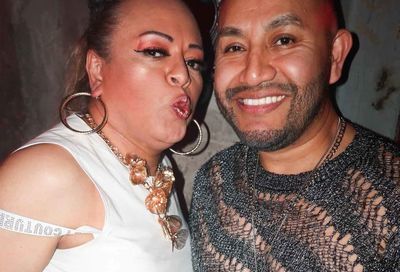House Democrats select Nancy Pelosi as their next Speaker in closed caucus
Presumptive Speaker and longtime ally of the LGBTQ community puts down rebellion within Democratic caucus

House Minority Leader Nancy Pelosi has won the nomination of a majority of the Democratic caucus to be the next Speaker of the U.S. House of Representatives when the 116th Congress convenes in January.
Democrats held their leadership elections on Wednesday, Nov. 28, with a super-majority of the caucus backing the 78-year-old California Democrat in a vote conducted via secret ballot. According to a tweet from NBC News, Pelosi gained 203 votes for speaker, with 32 Democrats voting against her and three Democrats leaving their ballots blank. One member was absent, and another potential member, T.J. Cox, has not yet been called the winner of his race, but currently leads in the vote count in a district located in California’s Central Valley.
House Democrats vote breakdown for Rep. Pelosi's nomination to be speaker of the House:
• 203 yes
• 32 no
• 3 blank
• 1 absent https://t.co/qzeNV7SJEr— NBC News (@NBCNews) November 28, 2018
Pelosi claimed victory Wednesday, putting her one step closer to becoming Speaker when her nomination officially comes up for a vote.
One of the primary objections to Pelosi is that she and her leadership team — consisting of septuagenarians Steny Hoyer of Maryland and Jim Clyburn of South Carolina — have overseen four straight cycles prior to 2018 in which Democrats failed to win back the House, indicating there may be a need for new ideas and fresh leadership within the caucus.
Additionally, Democrats from Republican-leaning districts have complained that Pelosi’s liberal pedigree and propensity for gaffes rubs conservative voters the wrong way and can make it harder for members to hold onto their seats. Republicans seem to have agreed with that sentiment, as they have run hundreds of attack ads attempting to tie vulnerable Democrats to Pelosi in recent cycles.
But notably, opposition to Pelosi decreased from two years ago, when she was challenged by U.S. Rep. Tim Ryan (D-Ohio) and 63 Democrats voted against her in the closed caucus. However, when she was nominated against current Republican Speaker Paul Ryan in January 2017, only four Democrats publicly abstained or voted for other political figures.
Realizing that she needed to quell rebellion within the ranks of the Democratic caucus, Pelosi has set about since the Nov. 6 election asking newer members for their vote and negotiating with those concerned about allowing younger members of the party the opportunity to advance. She also negotiated a deal with members of the progressive wing of her party by promising them positions on influential committees.
Most importantly, Pelosi has encouraged members who distanced themselves from her this cycle or who are from conservative districts to vote “present,” which would reduce the number of votes she needs from 218 to a lower number without risking the election of Republican Leader Kevin McCarthy as Speaker.
“Pelosi has released some members to vote no in caucus and then vote present on the House floor,” a Democratic lawmaker familiar with negotiations over the party’s leadership told NBC News.
The leadership vote came just after Pelosi struck a deal with nine Democrats who were members of the bipartisan Problem Solvers Caucus that would change rules to give greater power to rank-and-file lawmakers and make it easier to break partisan gridlock. Those Democrats had initially vowed to withhold support from Pelosi until she committed, in writing, to the changes.
LGBTQ organizations have largely been supportive of Pelosi’s candidacy for Speaker, noting her strong support for pro-LGBTQ legislation such as the Equality Act and her history of opposing attempts by the Trump administration to reverse or repeal protections for the LGBTQ community.
Initially, a group of 16 rogue Democrats had vowed to oppose Pelosi as leader, even suggesting that U.S. Rep. Marcia Fudge (D-Ohio) might be a better candidate for Speaker. The nomination enraged some LGBTQ activists, who noted that Fudge is one of only two incumbent Democratic members of Congress — the other being Rep. Dan Lipinski of Illinois — who have not expressed support for the Equality Act, which would amend the Civil Rights Act to include protections for sexual orientation and gender identity.
But Fudge eventually endorsed Pelosi and negotiated a deal in which Pelosi would restore a now-defunct subcommittee on elections and make Fudge its chairwoman.
The LGBTQ media advocacy organization GLAAD praised the Democratic caucus’s selection of Pelosi as its nominee.
“Long before LGBTQ visibility and acceptance became mainstream topics of discussion, Nancy Pelosi stood side-by-side with LGBTQ Americans during the community’s most pivotal moments — from the HIV and AIDS crisis to today fighting back against the proposed ban on transgender service members,” Sarah Kate Ellis, the president and CEO of GLAAD, said in a statement.
“Congresswoman Pelosi was with us when many were against us,” added Ellis. “As the current administration aims to erase LGBTQ people from the fabric of this nation at every turn, we need an ally like her holding the Speaker’s gavel and fighting for acceptance of all Americans.”
Support Metro Weekly’s Journalism
These are challenging times for news organizations. And yet it’s crucial we stay active and provide vital resources and information to both our local readers and the world. So won’t you please take a moment and consider supporting Metro Weekly with a membership? For as little as $5 a month, you can help ensure Metro Weekly magazine and MetroWeekly.com remain free, viable resources as we provide the best, most diverse, culturally-resonant LGBTQ coverage in both the D.C. region and around the world. Memberships come with exclusive perks and discounts, your own personal digital delivery of each week’s magazine (and an archive), access to our Member's Lounge when it launches this fall, and exclusive members-only items like Metro Weekly Membership Mugs and Tote Bags! Check out all our membership levels here and please join us today!
























You must be logged in to post a comment.